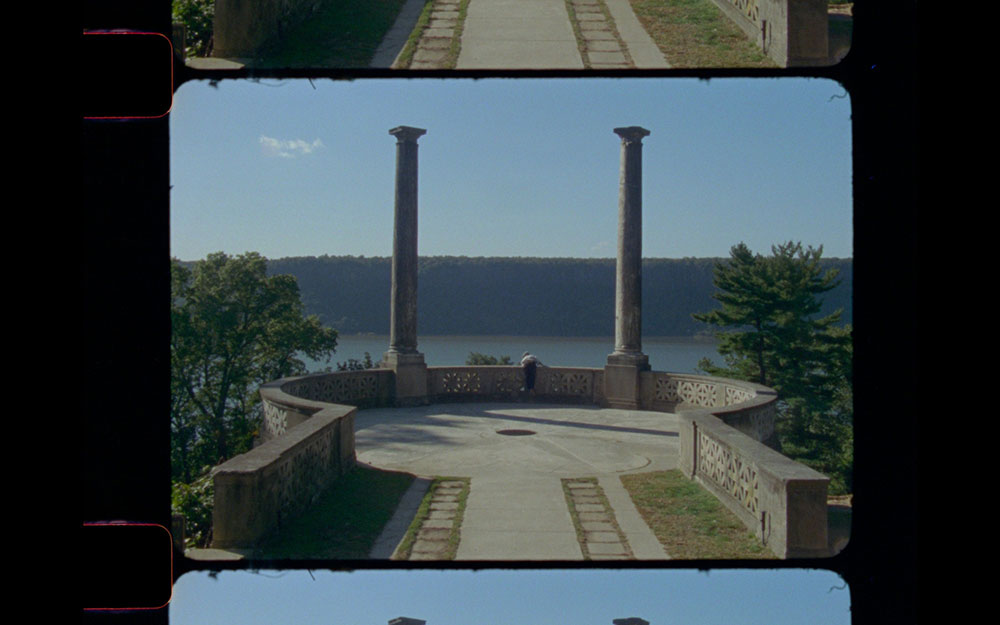Certain stories are archetypal shapes, their forms continually reiterated over history with different characters, different settings, and different specificities. The story of American belonging is one such story. What it means to be American, and to be expected to inhabit a personhood crafted upon fictions of prosperity and aspiration, is the story most readily lived by those whose hearts might exist elsewhere, wishing for their homelands or their parents’ homelands. In Natalia Lassalle-Morillo’s En Parábola/Conversations on Tragedy Part I, which screens at Amant until June 23, the story of the Puerto Rican diaspora is the tragedy. To exist in New York, your blood from another island, is to stand outside the language of the United States—English, capitalism, the logics of both ascendancy and whiteness—and to be permanently “strange and in-between,” as Lassalle-Morillo's film tells us.
At Amant, the Puerto Rico-born artist Lassalle-Morillo splits her film between three screens. The action on display is rupture—which, in En Parábola, is a force of aggravation and renewal. While the film is part of Lassalle-Morillo's broader installation featuring artwork, reading, letters, and documents, En Parábola itself is multiple: a reenactment of the tragedy of Antigone, spoken poetry, documentary, and performance. Much of the film is interested in the feeling of process; the story, after all, is a communal story, crafted and woven by many. The writing and acting of a communal story is the core process toward which En Parábola skews its eye self-reflexively; Lassalle-Morillo includes footage of the creation of this film, which began with an open call inviting Puerto Ricans living in New York to join Lassalle-Morillo for a reading of the tragedy of Antigone. “You don't need to act; you don't need to perform,” Lassalle-Morillo tells participants in her film. She has carved “holes” into her script, invitations for provocation that, if she is so moved, allow a participant to respond with the word agua and take the microphone. Emma (Emma Suárez-Báez), who plays Antígona, says in the film that Antigone doesn’t believe in heroines. Neither does En Parábola, which is dialogically built upon the varied voices of many synthesizing into a collective movement.
The act of watching this film across three screens brings to mind the discontinuities of self, especially the multi-national self that is dashed with asides about all the places where one is actually from, if anyone could be said to originate from any one place. Throughout the film, and its three occasionally disjunct screens, is the sense of grief, a mourning for a more easily legible existence, and more easily touched histories. The four women in this film — Emma, Erica (Erica Ballester), Nina (Nina Lucía Rodríguez), and Raquel (Raquel Aurelia Rodríguez) — play the principal characters in the tragedy of Antigone, but also in the tragedy of diaspora. Each has a different relationship to Puerto Rico: Emma moved to the United States as a teenager; Erica and Raquel were born and raised in New York to immigrant families; Nina is generations removed from the first members of her family to move here. No matter their exact relationship, these women are all compelled and haunted by the myth of singularity.
What holds this film, like the island of Puerto Rico, is water. The film opens with shots of water; the credits roll, almost mutely, with the sound of tides in the background. Images of water—of the peripheries of water, of the movement of water, and of bodies of water—are what Lassalle-Morillo returns to throughout her film. Water, much like the action of the film itself, can be both disruptive and continuous. Water, too, is like language. It moves freely, finding will and substance no matter which land it arrives in. During the film, even screens that recede into momentary visual blackness continue to present subtitles in both English and Spanish; the participants in the film also freely speak in both languages. Language provides something solid and concrete amid the mirages of destination that populate the lives of diaspora. Raquel writes on white paper as she voice-overs: “American dream, check. Connection to the island, check. Now what? Diaspora, yearning, feeling stuck.” She begins to write out a question, crossing out “can I.” “May I,” Raquel writes in amendment, “return?” Nina tries to return to her family's old home in Puerto Rico twenty-four years after she had last been, only to experience it in a state of derelict. “There was no key,” Nina says. Fantasies rupture, too. Some of us spend our entire lives searching for keys, cast between disparate selves and screens, patiently dreaming of what it might feel like to know home.
En Parábola/Conversations on Tragedy Part I is on view through June 23 at Amant.



